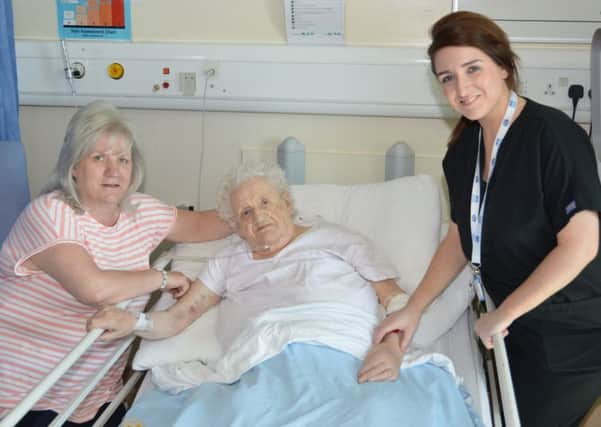Wishaw Hospital dementia patients to get Theatre Buddy


The hospital has launched a Theatre Buddy scheme, where relatives and carers are able to go with patients who have dementia to the operating theatre and stay with them until they have had their anaesthetic and gone to sleep.
Wishaw was the first hospital in Scotland to join a ground-breaking initiative to help patients with dementia - John’s Campaign.
Advertisement
Hide AdAdvertisement
Hide AdFollowing a successful trial, every ward in the hospital signed up to the campaign, which supports people with dementia by ensuring they are surrounded by familiar faces around the clock by letting their carers stay with them on the ward.
John’s Campaign was launched after the death in 2014 of Dr John Gerrard, who was diagnosed with Alzheimer’s in his mid-70s and spent some time in hospital.
His daughter, Nicci Gerrard, founded the campaign with her friend Julia Jones. Staff are urging families and carers to take advantage of the opportunity to stay on the ward outside regular visiting times or accompany them to the operating theatre. Maureen Dobbin, senior nurse for surgical critical care and theatres, said: “We feel passionately about doing more for our patients with dementia.
“As the first Scottish hospital to sign up to John’s Campaign across all of our wards, we were motivated to apply the same principles in our operating theatres.
“Going for surgery can be scary for any patient and a worrying time for their loved ones. When the person who is having the surgery also has dementia this can be even more traumatic. Now, at whatever stage in their journey through our hospital, patients with dementia do not have to feel confused, upset or alone.”
Yvonne Jeffery, from Netherton, was one of the first relatives to become a Theatre Buddy after her mum, Mary Devanney, needed surgery on a fractured hip. Mary, 88, who sustained her injury after a fall, was diagnosed with Alzheimer’s eight years ago.
Yvonne said: “I was so glad I could be there for my mum thanks to this wonderful initiative. My experience of being a Theatre Buddy was excellent and I would recommend this to anyone to help make the journey easier for their loved one.
“All of the clinical staff involved from start to finish were fantastic. They kept me informed about all the stages of my mum’s procedure. The doctors and nurses are very professional and I would like to thank them with all my heart.”
Advertisement
Hide AdAdvertisement
Hide AdA new Theatre Buddy trolley has also been introduced. This contains items to help calm the patient including stress balls and twiddle muffs if required.
It also has iPods with songs from the patient’s favourite era and a theatre purse if they would like to take small precious objects, like jewellery, with them.
Corinne Barrett, trauma liaison nurse practitioner, said: “Our team is committed to providing the best possible care for our patients. Thanks to John’s Campaign, we have been focusing more on how we care for our patients with dementia when they go to surgery.
“ This inspired us to think about any improvements we could make and we thought we could give relatives and carers the same access as parents of the children that we operate on in theatres.
“As well as being there during the anaesthetic procedure, the relative or carer can also be with the patient in the immediate post-operative phase.
“This is a time that can be an extremely confusing for any patient, let alone patients with dementia.”
